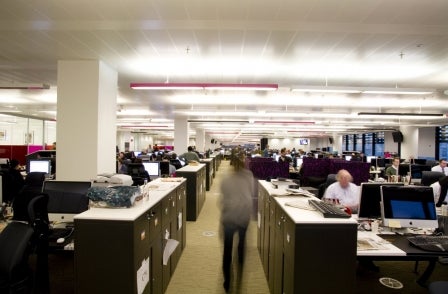
Guardian News and Media staff have been warned that cost savings are needed are needed in response to an "incredibly challenging market".
Chief executive David Pemsel told staff in a memo: "Guardian Media Group, like other publishing and digital media companies, is operating in an incredibly challenging market. This is shaping up to be one of the most difficult trading periods we've faced in many years.
"For the whole sector, the UK market decline in print advertising could be 20 per cent this year. Most publishers are also reporting a significant slowing in the rate of digital advertising growth as spending migrates to the likes of Facebook and Google at a far faster rate than previously seen."
Guardian Media Group currently has cash reserves of £840m and reported underlying losses in the year to the end of March 2015 of £19.1m on revenue of £214.6m. Those reserves could grow above £1bn when it sells its share in Top Right Group.
But Pemsel warned that these reserves are "finite and modest by some standards".
He said: "We must, as a result, maintain strict control on costs and be more disciplined on spending. We must continue to close the gap between the likely slowdown in our revenue growth, experienced by all in our industry, and the outflow of costs which we can and must control. This will inevitably impact recruitment, pay, travel and expenses, and will require each of us to play our part.
"We must, in other words, do everything we can to balance the books. By doing so, we will create some financial room to manoeuvre, which will – in turn – enable us to continue investing in areas of growth."
According to Politico which first reported this story, "steep editorial cutbacks" are on the way at The Guardian and an end to "lavish spending".
In February 2013, Guardian News and Media announced that 58 journalists had taken voluntary redundancy as it sought to cut £7m from the annual budget. That brought the editorial headcount to around 600.
In March this year, Guardian News and Media revealed there were 968 “core editorial staff” who had the right to vote on who they wished to succeed Alan Rusbridger as editor.
The two figures are not directly comparable, because the 968 is said to include some freelances and casuals. But the number of full-time editorial staff has rapidly increased since 2013 – partly as a result of expansion in the US and Australia.
Katharine Viner succeeded Rusbridger as editor in June and is working with Pemsel on a strategic review of the company.
Print sales of The Guardian fell 7.6 per cent in September to 166,977. Website traffic grew last month to 8.4m unique browsers (different devices) per day, up 29 per cent year on year.
Pemsel's memo:
Colleagues,
Guardian Media Group, like other publishing and digital media companies, is operating in an incredibly challenging market. This is shaping up to be one of the most difficult trading periods we've faced in many years. For the whole sector, the UK market decline in print advertising could be 20% this year. Most publishers are also reporting a significant slowing in the rate of digital advertising growth as spending migrates to the likes of Facebook and Google at a far faster rate than previously seen.
These are changes which will not be reversed, and GMG is not immune to them.
We are, nevertheless, adapting to this new market reality from a position of relative strength. GMG was one of the few UK media companies to report positive revenue growth in the past financial year. We are anticipating revenue growth again this year, albeit lower than forecast. We enlarged our investment fund through the sale of Trader Media Group and other assets, and have seen solid returns from our investments in Guardian US and Australia. Guardian Membership is showing positive uplift too.
But our reserves are finite and modest by some standards. We must, as a result, maintain strict control on costs and be more disciplined on spending. We must continue to close the gap between the likely slowdown in our revenue growth, experienced by all in our industry, and the outflow of costs which we can and must control. This will inevitably impact recruitment, pay, travel and expenses, and will require each of us to play our part.
We must, in other words, do everything we can to balance the books. By doing so, we will create some financial room to manoeuvre, which will – in turn – enable us to continue investing in areas of growth.
As part of this, Kath and I have initiated the strategic review – ‘Project 2021’ – which, when complete, will provide a framework for the years up to 2021 and beyond. We will share an update and interim findings with you soon.
In the meantime, thank you all for your continued efforts and for your contribution to the on-going transformation across the Group.
David
Email pged@pressgazette.co.uk to point out mistakes, provide story tips or send in a letter for publication on our "Letters Page" blog
